

Lessons learned from flooding disasters. 03/08/2010 at 9:17 pm.
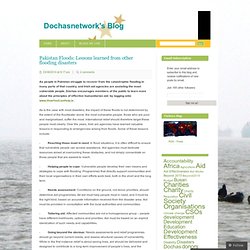
Floods: Stemming the tide in West Africa. Flooding can be particularly devastating for poor communities.
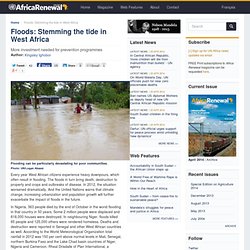
Photo: UN/Logan Abassi Every year West African citizens experience heavy downpours, which often result in flooding. Resources about Floods and Water Sanitation. The Cochrane Reviews in this Evidence Aid Special Collection are freely available; please click on the links below to access the reviews.
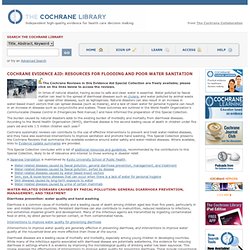
In times of natural disaster, having access to safe and clean water is essential. Lessons learned from droughts. DISASTERS: Learning from Japan's tsunami. Some 16,000 people lost their lives in the disaster BANGKOK, 9 March 2012 (IRIN) - Japan is widely regarded as well-prepared for disasters, being used to frequent tsunamis, cyclones, earthquakes and volcanic activity, but a year after the calamitous events of 11 March 2011, the lessons from the multi-disaster still resonate.
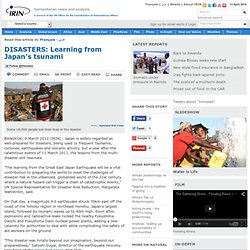
"The learning from the Great East Japan Earthquake will be a vital contribution to preparing the world to meet the challenges of disaster risk in the urbanized, globalized world of the 21st century where a natural hazard can trigger a chain of catastrophic events," UN Special Representative for Disaster Risk Reduction, Margareta Wahlström, said. On that day, a magnitude 9.0 earthquake struck 70km east off the coast of the Tohoku region in northeast Honshu, Japan's largest island, followed by tsunami waves up to 40m high.
According to Japanese authorities, close to 16,000 people died and 6,000 people were injured, while more than half a million were made homeless. Global Humanitarian Assistance Report. World Disasters Report. Natural Hazards, Unnatural Disasters. Dealing with disasters: The Need for Increased Collaboration. The world we live in is certainly not a perfect place.
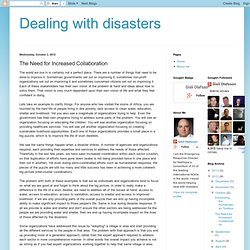
There are a number of things that need to be done to improve it. Sometimes governments set out on improving it, sometimes non-profit organizations set out on improving it and sometimes concerned citizens set out on improving it. Each of these stakeholders has their own vision of the problem at hand and ideas about how to solve them. That vision is very much dependent upon their own vision of life and what they feel confident in doing. EM-DAT Disasters Database. IRIN on water & droughts. Read this article in: عربي Droughts seem to be increasing, but so are methods to survive them STOCKHOLM, 13 September 2013 (IRIN) - Droughts are rarely seen as a positive development.
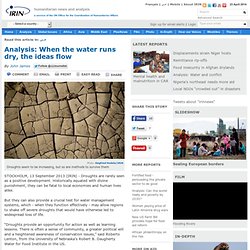
Historically equated with divine punishment, they can be fatal to local economies and human lives alike. But they can also provide a crucial test for water management systems, which - when they function effectively - may allow regions to shake off severe droughts that would have otherwise led to widespread loss of life. “Droughts provide an opportunity for action as well as learning lessons.
EU to focus on building resilience. The EU's emergency and development arms are to work together more closely to reduce the vulnerability of the poorest households to shocks from conflict, drought and other crises, and to tackle the underlying causes of food insecurity in regions such as the Sahel and the Horn of Africa.
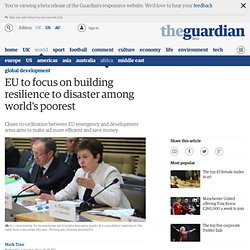
EU officials said the approach, outlined in a new policy document, was designed to build resilience in communities to withstand the impact of future crises and disasters – and save money in the long-run at a time of growing pressure on aid budgets. "Unexpected natural catastrophes, food crisis or economic shocks can seriously undermine the results of our work in developing countries," said Andris Piebalgs, the EU commissioner for development. Resilience & Risk Reduction. EU approach to resilience: Learning from food crises. European Commission Brussels, 3 October 2012.
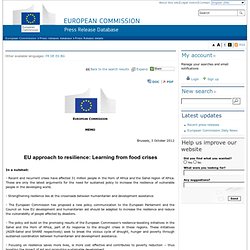
EU to focus on building resilience to disaster among world's poorest. EU commissioner for humanitarian aid Kristalina Georgieva speaks at a consultation meeting on the Sahel food crisis earlier this year.
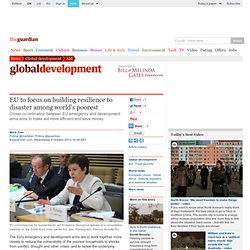
Helping Africa manufacture its own emergency and disaster relief supplies. Extreme Weather. Whenever an episode of extreme weather – heatwave, flood, drought, etc – hits the headlines, someone somewhere is sure to point the finger of blame at human-induced climate change.
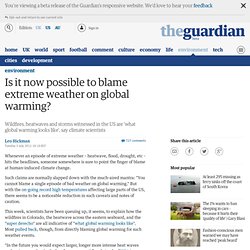
Such claims are normally slapped down with the much-aired mantra: "You cannot blame a single episode of bad weather on global warming. " Climate Change & Disaster Risk Reduction. Dealing with disasters: The Sandy Legacy. Less than a week has passed since Hurricane Sandy passed over the Caribbean and the US East Coast, leaving a trail of destruction and death behind. Only seven years have passed since Hurricane Katrina, one of the costliest disasters of all times left a similar trail of destruction on the Gulf Coast. Thankfully a lot of lessons were learnt from Katrina, especially when it comes to leadership and organizational issues. But sadly there are many issues that we will have to learn and re-learn from Hurricane Sandy. One of the things that makes Hurricane Sandy so special is the massive geographical area that was affected.
It is way larger than anything we have ever seen before. European Consensus on Humanitarian Aid. The core humanitarian principles of humanity, impartiality, neutrality and independence underpin the day-to-day operations of humanitarian organisations. Humanitarian principles can lay the foundations for the trust and acceptance that enable NGOs, the Red Cross/Red Crescent and UN agencies to operate.